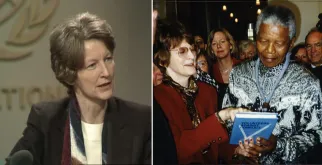Dr Brenda Gael McSweeney (United States) served as Executive Coordinator of the United Nations Volunteers (UNV) programme, from 1988-1997. She led UNV at a time when nearly 4,000 UNV specialists were serving annually in technical cooperation in the economic and social fields, community-based initiatives for self-reliance, humanitarian relief and rehabilitation, and UN peacekeeping operations. On 24 October 1997, Dr McSweeney was awarded, on behalf of the UN Volunteers, the Médaille de Chevalier de l’Ordre National from the Government of Burkina Faso in tribute to this meaningful and innovative work. As UNV turns 50, we feature an interview (1995) conducted by Frank Fremerey, CEO of HOME, and a video interview, conducted by Michael Littlejohns for the UN World Chronicle series, with our former Executive Coordinator. Find out more about Brenda's reflections on our mandate, work and partners 30 years ago.
Volunteers and Volunteerism
The most important aspect for me about United Nations Volunteers is the power and the impact of the fact that people give of their time. They contribute their time for causes such as peace and development. It is very compelling when people go to neighbouring villages, countries, other parts of the world and share expertise on a peer basis. In other words: tackle together problems at the invitation of the host governments or non-governmental organizations. They share the issues in looking from the vantage point of the expertise of the nationals first of all, building on the local and indigenous technical knowledge, then adding to that some vantage points from the outside. Very often new solutions are forged.
The volunteers, because they are giving their time, have great credibility at the country level. This is true for development work. It is equally true for humanitarian work, including human rights promotion and peacebuilding work. UN Volunteers who join communities at conflict, try together with them to find a way to defuse tensions and set up a new basis, a new foundation for peaceful coexistence that will be lasting.
The International Year of Volunteers: 2001
In fact this concept of volunteering is so powerful that a number of volunteer and voluntary groups are very interested in having a UN International Year of Volunteers. They have chosen the year 2001 to make a statement about the first year of the new century.
The new millennium should be based on giving and sharing, and forging a new paradigm for development and peace. So we are very hopeful, after a Policy Forum in Japan, the Center for European Volunteers based in Brussels, and the YWCA (Young Women's Christian Association) with 250 million members around the globe, made a call for the UN Year of Volunteers. The Peace Corps recently hosted in the United States a conference of international volunteer-sending groups from the South: from Africa, Asia and Latin America and from the North, and they too endorsed the idea of 2001 as the international UN Year of Volunteers.
Michael Littlejohns interviews Brenda McSweeney, Executive Coordinator of the United Nations Volunteers (UNV) Programme, for World Chronicle programme 437.
What the Executive Coordinator and UNV expect of Bonn and of Germany
From experience so far, we have had 100 per cent support both from the City and from the Federal authorities: the Mayoress herself first invited a team of over twenty selected representatives from UNV to come to Bonn in order to get a feel for what it might mean to be relocated and live in Bonn. She then came down to Geneva, to address all of the staff and to answer any questions they might have. The City is also partly financing up to 20 per cent of the relocation costs of the UNV programme.
The Federal Government took numerous steps to help UNV. First of all they doubled their contribution to our programme work. We will be able to use Germany's funding for community-focused initiatives, participatory approaches, building on the priorities of the communities themselves in the developing countries, including communities in the urban slum areas in accordance with the themes and the Plan of Action of HABITAT II.
The Government is also financing the entire cost of our relocation. They budgeted a sum of 19 million Deutschmark over a four-year period to meet the actual cost of removal. In addition to that we have had very powerful political backing and support from the Government.
The very fact that Development and Economic Cooperation Minister Carl-Dieter Spranger, along with Foreign Minister Klaus Kinkel, co-sponsored an introduction of UNV to the press with me at the Federal Press Conference is an expression of this support. At the same time we launched a volume that is called "Volunteers against conflict", a book written by the volunteers themselves about their experiences in elections in Cambodia, South Africa, and in Mozambique, where volunteers also worked to help demobilize soldiers and then reintegrate them into their home communities or communities of their choice.
We have had contacts with North Rhine Westphalia. Dr. Gerhard Konow, a representative of Düsseldorf here in Bonn, took early contact with us and was interested to explore potential sources of talent for our entrepreneurship arm, UNISTAR.
As the first UN organization to be headquartered in Germany, we are hoping indeed that we can also have alliances with many of the organizations that are tackling environmental issues.
You can read more about Brenda's work on her site.
This article was also published by HOME in German.

